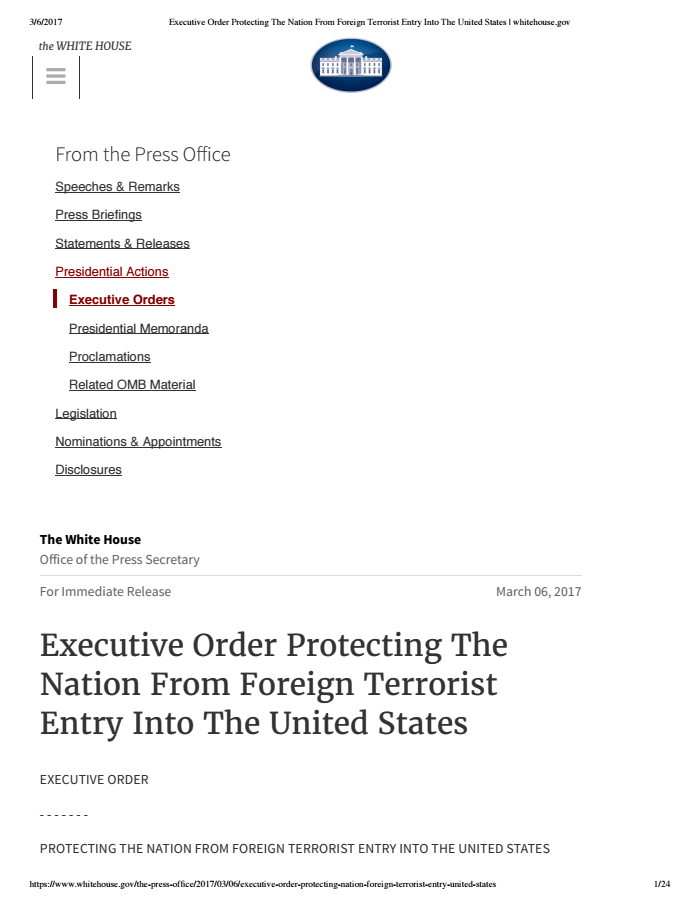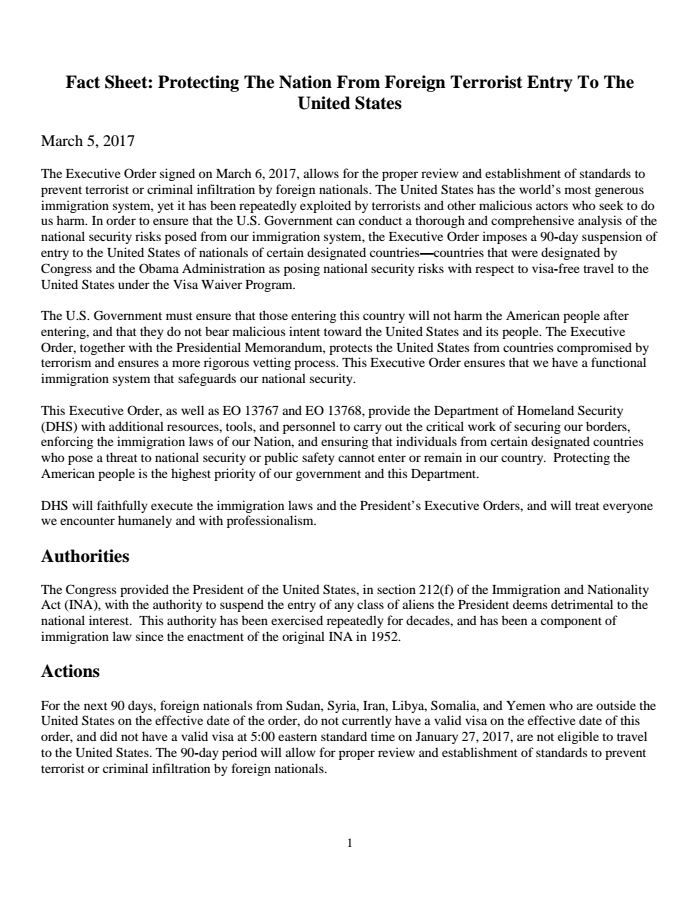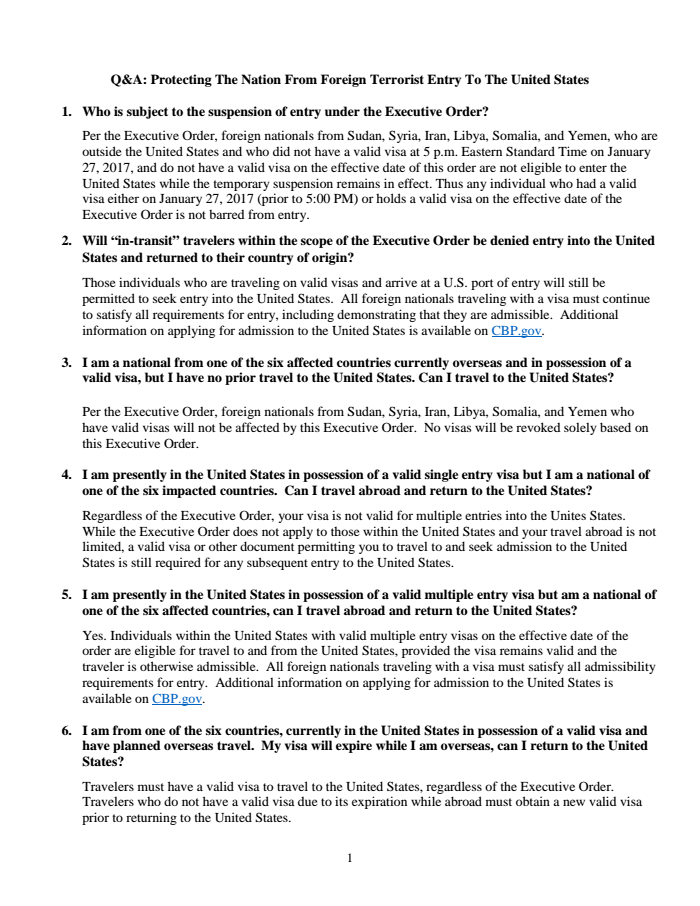
WASHINGTON — President Trump signed a revised, and significantly downsized, version of his refugee and travel executive order on Monday that will take effect on Mar. 16. The original order — which caused a national uproar and nationwide litigation — will be revoked as of then.
The president signed the new executive order without the usual room full of photographers, reporters, and live video feeds. Press secretary Sean Spicer tweeted a photo of Trump signing it.
People from Sudan, Syria, Iran, Libya, Somalia, and Yemen who are outside the United States and don't have a valid visa "are not eligible to travel" to the US for 90 days, according to the text of the new order and a fact sheet distributed by the administration.
Iraq was included with those nations in the first order, but was removed this time around. Trump's counselor, Kellyanne Conway, said on Fox News that was because of "their enhanced screening and reporting measures" — information also laid out in the order itself.
The order also makes explicitly clear that legal permanent residents and current visa holders are not covered by the order — points of repeated confusion in the aftermath of the signing of the original order. A State Department official, during a briefing with reporters on Monday, said there are no plans to "revoke any visa provisionally due to this executive order."
"You should not see any chaos, or alleged chaos, at airports. There will not be people stopped at airports because of this order," a senior Department of Homeland Security official said on a conference call to reporters.
The refugee admission program will be suspended for 120 days, and, as with the original order, "admissions to the United States will not exceed 50,000 for fiscal year 2017." However, the program for resettling Syrian refugees — which was indefinitely banned under the initial order — will now be treated no differently than resettlement of refugees from all other countries.
A provision in the original order that gave refugee admission priority to those whose religion is "a minority religion in the individual's country of nationality" — a provision that Trump had promoted as protections for Christians — was removed from the new order.
Within hours of the signing of the new order, the Justice Department informed the US Court of Appeals for the Ninth Circuit of the signing, highlighting differences between the original order and the new order. The court has been considering an appeal of the court order that had halted enforcement of the refugee and travel bans in the original executive order.
The Justice Department also quickly weighed in at the district court level in the Washington v. Trump case, informing the court of the department's view that the existing injunction would not cover the new order. "This Court’s injunctive order does not limit the Government’s ability to immediately begin enforcing the New Executive Order," the lawyers wrote. Additionally, they argue that the new order "complies with" the appeals court's decision and that the new order "does not present a need for emergency litigation."
Washington Attorney General Bob Ferguson, who led his states successful fight against the original order, called the new order "drastically narrowed" in a news conference on Monday afternoon, adding, "The changes in this new executive order are profound. ... That's a rewarding feeling, as a legal team." He said that his team would review the new order in the coming days before deciding on their next steps.
Virginia Attorney General Mark Herring, who has been pressing separate legal claims in a different lawsuit, reacted similarly to the new order, saying in a statement, "This pared-down order is an incredible concession from President Trump that all but concedes the significant constitutional and practical flaws that the Courts and I saw in his original ban." He, too, said that his team would review the new order before determining the next steps.
Omar Jadwat, a senior staff attorney with the ACLU's Immigrants' Rights Project, however, told BuzzFeed News in an email that he expects challenges to the new executive order to be lodged in at least some of the pending court cases filed against the original travel ban, as opposed to lawyers starting over with new lawsuits.
"While scaled back, the new ban is, at its core, the same unconstitutional attempt to enact religious discrimination as the first one was. Once we have the ban in hand, we will take the appropriate steps in our ongoing litigation to prevent it from going into effect," Jadwat said.
In a statement, House Speaker Paul Ryan supported the new order, saying, "This revised executive order advances our shared goal of protecting the homeland. I commend the administration and [DHS] Secretary [John] Kelly in particular for their hard work on this measure to improve our vetting standards."
A spokesman for Iraq's government, Saad al-Hadithi, said the nation's removal from the list sends a "positive message" about working together to defeat ISIS and shows there is a "real partnership" between the countries.
Secretary of Defense Jim Mattis was consulted on the new order and gave his input, Pentagon spokesman Navy Capt Jeff Davis told reporters Monday. But Davis would not elaborate on Mattis recommendations for the ban.
Trump signed the first executive order at the Pentagon's Hall of Heroes, a room dedicated to recipients of the US military's highest decoration, the Medal of Honor. Mattis stood behind the president during the ceremony, which then included banning visitors from Iraq, even as US military troops are in Iraq and fighting alongside Iraqi troops. Iraq's inclusion in the ban drew sharp rebuke from many in the military, including Mattis, who officials said was not aware of the specifics of the ban when he was photographed with Trump at the time.
The new order — and its unceremonious rollout — is a quiet acknowledgement by Trump of the challenges his administration faced trying to implement the original order. It also comes after Trump spent the weekend lashing out to his staff, and on Twitter, at former President Obama — and his Apprentice successor.
In revoking the first order, Trump is also acknowledging that a move from his first days in office was met with enough resistance that it needed to be rescinded.
It's a rare move for any president, let alone this one: In doing so, Trump essentially is stepping back — for the second time — from his position on how to address refugee and immigrant programs.
In December 2015, Trump called for "a total and complete shutdown of Muslims entering the United States until our country's representatives can figure out what is going on." The position — Trump's "Muslim ban" — became a key rallying point for, and controversy of, his early primary campaign.
Fast-forward to his presidency, though, and Trump's initial executive order — issued on Jan. 27 — looked a bit different, although still expansive, in comparison to the policies in place prior to the order. Trump's order halted entry into the US for 90 days to all people — with a few narrow exceptions — from seven Muslim-majority nations: Syria, Iraq, Iran, Sudan, Somalia, Libya, and Yemen. The order also halted the entire refugee program for 120 days and the Syrian part of the program indefinitely.
Perhaps most dramatically, the order took effect immediately, leading to confusion at airports across the country — particularly given the Friday afternoon signing and announcement of the order. That confusion — and reports of people being held at, and in some cases deported from, airports — then led to protests, first in New York and Los Angeles, but soon across the country.
About 30 hours after the order was signed, a federal judge in Brooklyn, US District Judge Ann Donnelly, halted deportations under the order. Throughout the weekend, other federal judges weighed in — all siding against the ban, including one court that added a ban on detaining individuals under the order and another court that ordered a person deported under the order to be returned to the US.
As the next week began, one of the primary issues of confusion was whether lawful permanent residents — green card holders — were covered under the travel ban. Eventually, the White House attempted to settle the issue with a "clarification" memo from White House counsel Don McGahn concluding that the ban does not apply to green card holders.
It wasn't until the next Friday, Feb. 3, that a judge sided with the administration. US District Judge Nathaniel Gorton denied a request to renew a temporary restraining order previously issued by another judge in the federal court in Massachusetts or grant a preliminary injunction.
Hours later, though, in Seattle, a different federal judge — US District Judge James Robart — issued the broadest ruling yet, halting enforcement of all of the major parts of the refugee and travel bans under the order.
The ruling effectively shut down the ban, leading to statements of compliance from the Department of Homeland Security and State Department — but also leading to the first of several pointed attacks from the Trump administration on Robart, who he referred to in one tweet as a "so-called judge."
The administration appealed, asking the US Court of Appeals for the Ninth Circuit to put Robart's order on hold while the administration appealed the merits of the district court's ruling. After holding arguments on Feb. 7, the appeals court sided with the challengers — the states of Washington and Minnesota — in a ruling handed down on Feb. 9.
While questions remained about whether the full court of appeals would reconsider that ruling, Trump announced on Feb. 16 that a new version of the order would be coming the week of Feb. 20. That was delayed until last week, but then, shortly after Trump's address to Congress, White House officials said the rollout would be delayed. (This coincided with news of Attorney General Jeff Sessions' previously unmentioned meetings with the Russian ambassador to the US — news that led to his recusal on related matters.)
Nancy Youssef contributed to this report.





